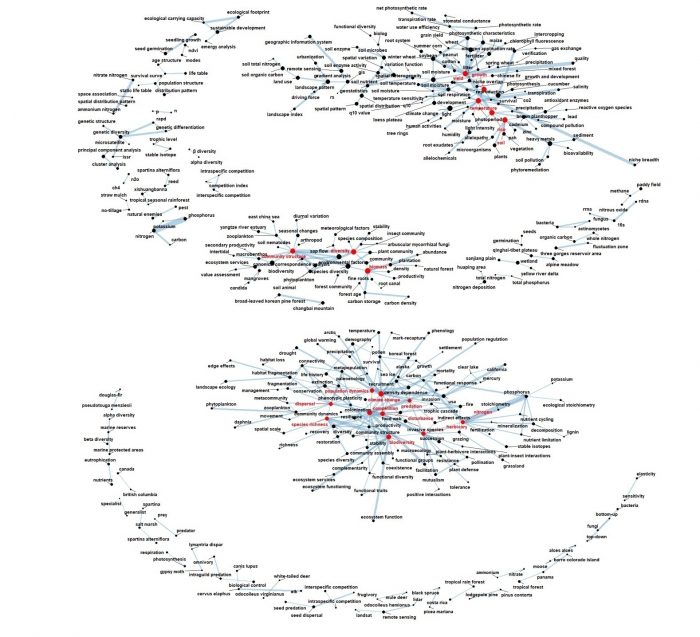
Global ecological issues require the joint efforts of ecologists around the world. Ecological literature has grown exponentially over the past three decades. However, international cooperation did not catch up at the same rate, which may be due to the lack of understanding and communication between transnational ecologists. As Louis Pasteur once remarked, “Science has no borders, but scientists have their own mother countries.” Ecologists would carry out research based on national physio-geographic conditions, which are very much determined by the biological resources of the surrounding environment. Also, economic, cultural, and political factors might all play their parts, leading scientists to conduct specific research on different topics.
Zhao and colleagues (2018) at the Ministry of Education Key Laboratory for Biodiversity Science and Ecological Engineering, Coastal Ecosystems Research Station of the Yangtze River Estuary, and Shanghai Institute of EcoChongming (SIEC), Fudan University, investigated 44,462 research in journals published by the Ecological Society of America (ESA) and Ecological Society of China (ESC) in recent three decades to compare the trends of ecology in China and the US.
Established in 1915, the American Ecological Society (ESA) is the largest ecological society with more than 9,000 members. The ESA strengthens links within and outside the ecological community to support the work of researchers and promote ecological science. Among its various publications, the ESA’s peer-reviewed journals are professional ecological journals serving ecological communities. It has a great impact in the US and abroad. On the other hand, the China Ecological Society (ESC) was founded in 1979 as a national non-profit academic organization. Managed by the Chinese Association for Science and Technology, it is one of the most important forces for improving ecological research and practices in China. Sharing common goals to bring ecologists together and promoting ecological academic activities, ESC is committed to advocating national ecological civilization policies. Its local journals, including Acta Ecologica Sinica, the Journal of Chinese Ecology, and the Journal of Applied Ecology in China, all reflect the ecological work of China. Furthermore, some publications of ESC now have an English version and have started to gain international attention.

Fig. 3. Keyword co-occurrence network of ESC journals (A) and ESA journals (B). The width of edges was scaled by the co-occurrence number of keywords and the node size was proportional to the keyword frequency in the last 30 years. The text labels near the nodes are the keyword represented by the nodes, and the red nodes with red text labels are ecological hotspots during the three decades. We could find that network of ESA (B) is more centralized, while the ESC network (A) could be divided into two clusters (one on the top right and the other at the bottom). Image republished with permission from Open Access article from Elsevier under CC BY-NC-ND 4.0: https://doi.org/10.1016/j.gecco.2018.e00509
In contrast, ecological papers in the US may contain more information than China, but as the number of ecological papers increases, Chinese ecological research might cover a wider range of topics. In China, the initiation of research usually comes from practical problems. While in the US, the starting point is usually an abstract theoretical issue. Generally, agriculture accounts for a large proportion of Chinese ecology. But in recent years, climate change and biodiversity have become hot issues, and ecologists in both countries regard it as a hot topic in ecological research. It is argued that with strong scientific research strength, the United States is one of the countries leading the trend of ecology. Although its ecological development history is short, China is learning fast and advancing rapidly.
Ecologists from different countries begin to conduct ecological research in different places and times, but they all aim to improve the common goals of the world through their knowledge and experience. In the information age that promotes the flow of knowledge, the globalization of ecological development may play an important role in uniting ecologists around the world and lead to greater and better research in the future.
These findings are described in the article entitled Different nation, different ecology: Comparison of ecological research features in China and the US during the recent three decades, recently published in the journal Global Ecology and Conservation.









